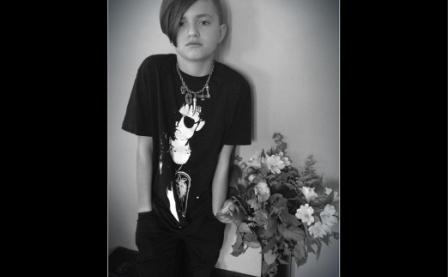Cold Cave is a synthpop/darkwave band led by Wesley Eisold, formerly the singer and lyricist of seminal Boston hardcore band American Nightmare (later known as Give Up the Ghost) and mathcore/noise rock collective Some Girls. Although his pedigree is firmly punk, Eisold has expressed in interviews his love for The Smiths, The Cure, and other electronic post-punk acts. But it’s hardly surprising that Cold Cave sound nothing like his prior work: Eisold has never played an instrument on record prior to Cold Cave, and he’s even professed disinterest for the musical styles of the bands with whom he’s previously performed.
Where Cold Cave’s first full-length Cremations (a compilation of the EPs and lone LP released prior to Love Comes Close) was often discordant and fragmentary, Love Comes Close is sleek and catchy, its songs feeling like finished pieces. It’s almost shocking how accessible they are, particularly given the history of Eisold’s bandmates. Prior to Cold Cave, Caralee McElroy was a member of Xiu Xiu, and Dominick Fernow creates some of the most cacophonous, fucked up noise I’ve ever heard as Prurient. Cold Cave’s is easily the poppiest music any of these musicians have been involved with. Nearly all of the tracks are bright, if not exactly buoyant, and filled with hooks.
One thing that hasn’t changed at all, though, is the tone of Eisold’s lyrics; he’s still as angry and hopelessly depressed as he’s always been. “I want to twist the knife a bit deeper/ To siphon the love from the hearts of the leaves.” “My heart breaks everything.” “Sing a song of death till there’s none left.” While Eisold’s lyrics in previous projects were amplified and transformed by the violence and can’t-stop-won’t-stop drive of his bandmates, here they fall pitifully flat.
More significant than musical context, though, is the slight but critical distinction between struggling against depression and luxuriating in it. Gone is his characteristic, stripped-throat scream, replaced with a tired, flat baritone equally reminiscent of Ian Curtis and Robert Smith. He sounds tired, colorless, apathetic. Despite Eisold’s lyrical and vocal experience, despite his purported status as cultural institution and latter-day savior of hardcore, what he comes up with here isn’t any more inspired than the work of every black-clad high school miserablist.
Don’t get me wrong: this album is far from unlistenable, and there’s certainly nothing as embarrassing here as Cremations’ “Heavenly Metals,” which sounded like La jetée plus The Terminator plus coffeehouse prose poetry. Eisold’s delivery, as cliché as it might seem, is often hypnotically compelling, and the lyrics are slightly redeemed by the synthesizers. And if despair turns you off, think of Cold Cave as just another flavor of pop escapism. It’s impossible for the well-adjusted to internalize, much less identify with. Perhaps it’s philosophically misguided and irritating in its unearned self-pity, but damn if it’s not a lot of fun. Even The Cure’s fan base includes countless well-adjusted adults who are in it for the escapism and the nifty synth lines. Eisold would do well to mellow out a bit, though, and not just for his mental health; there are already 27 million Cure albums floating around out there, and the average person can only take so much malaise before they go looking for something else.
More about: Cold Cave




